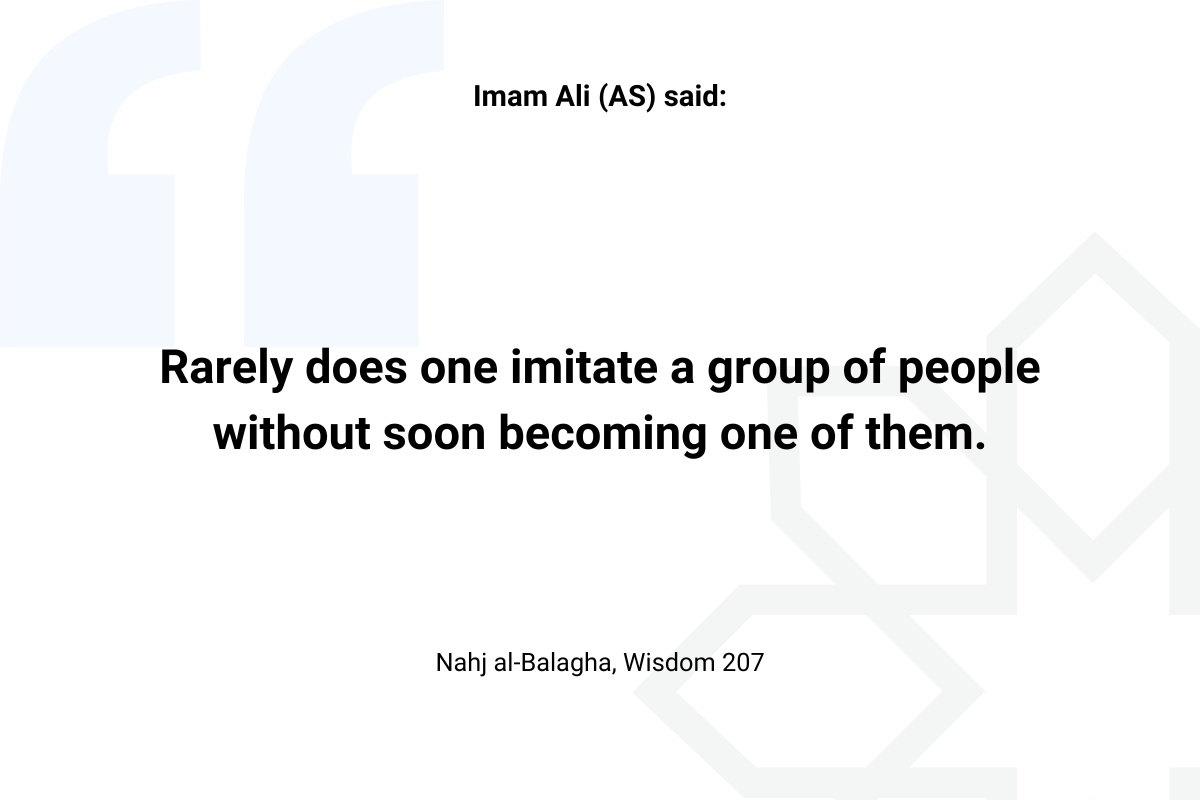Imam Ali (AS) said:
‘Rarely does one imitate a group of people without soon becoming one of them.’
– Nahj al-Balagha, Wisdom 207
The Power of Imitation: Insights from Imam Ali
Introduction
Imam Ali (AS), known for his profound wisdom and deep understanding of human nature, offers a timeless piece of advice in Nahj al-Balagha, Wisdom 207. This hadith speaks volumes about the influence of the company we keep and the behaviors we emulate. This article explores the implications of this wisdom and how it resonates with contemporary life, guiding us to make mindful choices about our associations and actions.
Understanding the Impact of Imitation
The Psychological Basis of Imitation
Imitation is a fundamental aspect of human behavior, rooted in our psychological makeup. Social learning theory, proposed by psychologist Albert Bandura, suggests that people learn from one another through observation, imitation, and modeling. This theory highlights the significant influence that observed behaviors have on an individual’s actions and development.
The Islamic Perspective on Imitation
In Islam, the company one keeps is considered highly influential. The Prophet Muhammad (PBUH) said, “A man follows the religion of his friend; so each one should consider whom he makes his friend” (Sunan Abu Dawood). This hadith aligns with Imam Ali’s teaching, emphasizing the importance of surrounding oneself with virtuous individuals to cultivate good character.
The Role of Environment in Shaping Character
Social Influence and Peer Pressure
The environment in which one lives plays a crucial role in shaping behavior and beliefs. Peer pressure, especially during adolescence and young adulthood, can significantly impact decision-making processes. Adolescents often adopt behaviors, language, and attitudes of their peer group to gain acceptance and approval.
Creating a Positive Environment
Islam encourages the creation of a positive and supportive environment that nurtures good behavior and moral integrity. Surrounding oneself with righteous individuals can lead to the development of virtues and the strengthening of faith. The Quran advises believers to associate with those who are truthful and righteous (Surah At-Tawbah 9:119).
Practical Steps to Avoid Negative Imitation
Self-awareness and Mindfulness
Being aware of the influence that others have on us is the first step in avoiding negative imitation. Mindfulness practices, such as regular reflection and self-assessment, can help individuals recognize and counteract undesirable influences.
Choosing Righteous Companions
Actively seeking the company of individuals who exhibit positive traits and moral integrity is crucial. Engaging in communities and groups that promote Islamic values can provide a supportive network and encourage personal growth.
Engaging in Positive Activities
Involvement in activities that align with Islamic teachings and promote personal development can serve as a buffer against negative influences. These activities include community service, attending religious classes, and participating in Islamic events and gatherings.
Conclusion
Imam Ali’s (AS) wisdom on the influence of imitation underscores the importance of mindful association and the impact of our environment on our behavior. By understanding and applying this teaching, individuals can make conscious choices to surround themselves with positive influences, thereby fostering a life of virtue and righteousness. For more insightful Islamic quotes, explore our extensive collection that offers daily inspiration and guidance.








